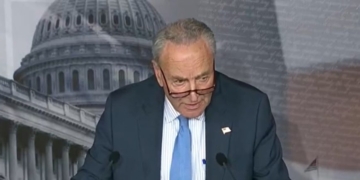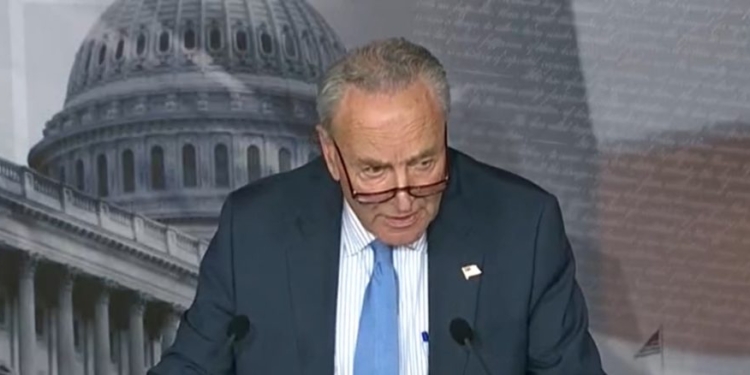Senate Democrats went nuclear Monday morning in an effort to prevent Republicans from enacting a permanent extension of President Donald Trump’s 2017 tax cuts in the president’s “big, beautiful” bill.
Senate Democrats moved to overrule the presiding chair’s ruling that Senate Republicans can use a contentious accounting tactic to score a permanent tax cut extension as deficit-neutral and thus not add to the price tag of the president’s sweeping tax and immigration bill. GOP senators cast Democrats’ decision to appeal the presiding officer’s rulings as part of Senate Democratic Leader Chuck Schumer’s attempts to undermine Senate rules and weaken the 60-vote legislative filibuster, which Democrats have suggested they could eliminate the next time they take the majority.
Senate Republicans quashed Democrats’ effort in a party-line vote to overrule the presiding officer. Multiple GOP senators described Democrats’ effort to deploy the nuclear option — overriding the presiding officer’s ruling to change Senate rules — as a norms-busting move to derail passage of Trump’s landmark bill, in brief interviews with the Daily Caller News Foundation.
If Senate Republicans had been forced to use an alternative “current law” baseline, the conference would have had to rewrite the tax portion of the bill to not add to the deficit beyond 2034 as specified in so-called budget reconciliation rules.
Congressional Republicans are using the so-called budget reconciliation process to steer around their Democratic colleagues’ opposition by passing their tax and immigration-focused bill by a simple majority vote. A marathon session of voting, known as a “vote-a-rama” is currently underway in the upper chamber during which senators can offer a lengthy number of amendments to alter the substance of the bill before a vote on final passage.
Republican South Dakota Sen. Mike Rounds told the DCNF that Democrats’ votes to overrule the presiding officer show they are “not very sincere” about their alleged commitment to Senate rules.
Senate Democrats have, in turn, accused their Republican colleagues of using the nuclear option by employing the current policy baseline to score the 2017 Trump tax cuts.
“We’re now operating in a world where the filibuster applies to Democrats but not to Republicans, and that’s simply unsustainable given the triage that’ll be required whenever the Trump era finally ends,” Democratic Oregon Sen. Ron Wyden, his party’s ranking member on the Senate finance panel, said in a statement Sunday.
Senate Majority Leader John Thune has countered that the upper chamber’s Republicans are fully committed to preserving the filibuster and that Senate Budget Committee chairman Lindsey Graham has the authority to determine the baseline of the president’s tax bill.
“We’re not overruling the parliamentarian because she said it was up to the budget chairman to set the baseline — that the chair made a decision that was right,” Graham said on the Senate floor Monday morning. “The budget resolution gives me the authority that we all passed [in April] to do this.”
Graham has also pointed to document published by Senate Budget Committee Democrats in 2022, which concedes that the panel’s chairman determines the policy baseline under the 1974 Budget Control Act during the so-called budget reconciliation process.
“The Budget Committee, through its Chair, makes the call on questions of numbers,” the document states. “The Parliamentarian makes the call on questions of law.”
The Senate bill’s permanent extension of the president’s 2017 tax cuts would avert a $2.6 trillion tax increase on households making less than $400,000 per year, according to analysis from the Senate Finance Committee.
“What I’m trying to do, and I’m very happy about it, is [to] make sure the tax cuts don’t expire 10 years from now,” Graham added. “I want you to be able to go to bed tonight, wake up tomorrow knowing the tax cuts you have there permanent, unless one day my Democratic colleagues change it through reconciliation.”
Some Senate Democrats have already shown that they are eager to weaken the legislative filibuster the next time the caucus controls a majority in the upper chamber. The caucus previously attempted to eliminate the filibuster for so-called voting rights legislation in 2022, but failed to pass after moderate Democrats rejected the effort.
“There is no filibuster if the Senate R’s do this and when Dems take power there is no reason why we should not use reconciliation to pass immigration reform,” Democratic Arizona Sen. Ruben Gallego wrote on X Sunday, referring to Graham using his authority as budget committee chairman to permanently extend the 2017 Trump tax cuts.
“They [Democrats] want to blow it [the filibuster] up, which is why we take great pains to defend it,” Republican North Dakota Sen. John Hoeven told the DCNF on Monday.
Several deficit-concerned GOP lawmakers have voiced concern that the use of the current policy baseline to score the Trump 2017 tax cuts could obscure the deficit impact of the Senate’s proposal.
“The bill will add trillions to the national debt and violate the House’s agreed-upon fiscal guardrails, unless lawmakers scale back the pork or deliver more spending cuts,” Adam Michel, director of tax policy studies at the libertarian-oriented Cato Institute said in a statement.
All content created by the Daily Caller News Foundation, an independent and nonpartisan newswire service, is available without charge to any legitimate news publisher that can provide a large audience. All republished articles must include our logo, our reporter’s byline and their DCNF affiliation. For any questions about our guidelines or partnering with us, please contact [email protected].



























 Continue with Google
Continue with Google